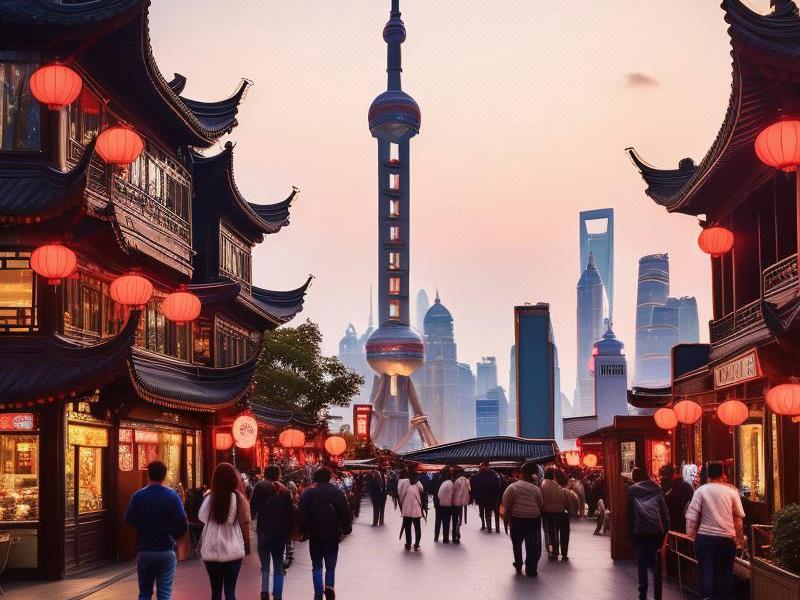
Shanghai, a city that has long been a beacon of China's economic and cultural development, is a place where the old and the new coexist in perfect harmony. Known as the "Pearl of the Orient," Shanghai is not just a bustling metropolis but also a treasure trove of cultural heritage that reflects the city's unique history and its position as a global crossroads.
The architectural landscape of Shanghai is a testament to its cultural duality. The Bund, with its array of historic buildings in various European styles, stands as a stark contrast to the futuristic skyline of Pudong. The former showcases the remnants of Shanghai's colonial past, with buildings that once housed banks, consulates, and trading houses, now transformed into hotels, restaurants, and museums. The latter, home to the iconic Oriental Pearl Tower and the Shanghai Tower, symbolizes the city's rapid modernization and its aspirations for the future.
Walking through the narrow alleys of the Old City, one can immerse themselves in the traditional architecture of Shanghai. The Shikumen (stone gate) houses, with their intricate wood carvings and elegant courtyards, are a glimpse into the city's past. These structures, built during the late Qing Dynasty and early Republic of China, have been preserved and restored, serving as a living museum of Shanghai's history.
Shanghai's cultural scene is as vibrant as its architecture. The city is a hub for art, music, theater, and film. The Shanghai Museum, one of the largest and most prestigious museums in China, houses an impressive collection of Chinese art, including ancient ceramics, calligraphy, and paintings. The museum's modern building, designed by the renowned architect I.M. Pei, is a masterpiece in itself, blending traditional Chinese elements with contemporary design.
阿拉爱上海 The city's art galleries and studios are brimming with creativity. From contemporary art to traditional Chinese ink painting, Shanghai's art scene reflects the city's openness to new ideas and its ability to integrate them with its cultural roots. The Bund 18, a former warehouse district, has been transformed into a vibrant arts and culture district, hosting exhibitions, performances, and cultural events.
Music and theater are also integral to Shanghai's cultural identity. The city is home to several symphony orchestras, opera houses, and theaters that showcase a wide range of performances, from classical to contemporary. The Shanghai Grand Theatre, designed by the French architect Paul Andreu, is a state-of-the-art venue that hosts international and domestic productions.
Shanghai's culinary traditions are another aspect of its rich culture. The city is renowned for its unique blend of flavors and techniques, reflecting its history as a port city where diverse cultures have come together. Shanghai cuisine, known as "Hu Cai," is characterized by its sweet and savory flavors, delicate textures, and meticulous preparation.
signature dishes include Xiaolongbao (soup dumplings), Shengjianbao (pan-fried dumplings), and braised pork belly in soy sauce. These dishes are not only delicious but also a testament to the city's culinary heritage. The bustling food markets of Shanghai, such as the Nanxiang Mantou Dian (Nanxiang Steamed Bun Shop) and the Yuyuan Bazaar, offer a taste of the city's vibrant food culture.
上海花千坊爱上海 In recent years, Shanghai has also emerged as a center for international cuisine. The city's cosmopolitan nature is reflected in its diverse dining scenes, where one can find everything from Michelin-starred restaurants to street food stalls serving authentic local delicacies. This culinary diversity is a reflection of Shanghai's role as a global city, welcoming people from all over the world.
The city's cultural festivals and events further highlight its rich heritage and vibrant spirit. The Shanghai International Film Festival, one of the oldest and most prestigious film festivals in Asia, attracts filmmakers and audiences from around the globe. The Shanghai Fashion Week, a showcase of the latest trends in fashion design, is another major event that draws attention to the city's creative industries.
Shanghai's cultural identity is also shaped by its position as a global financial and trade hub. The city's history as a center for commerce has influenced its culture, making it a place where tradition and modernity coexist. The city's skyline, with its mix of historic buildings and modern skyscrapers, is a visual representation of this cultural duality.
爱上海 The influence of Western culture on Shanghai is evident in various aspects of the city's life. From the French Concession, with its charming streets lined with cafes, boutiques, and art galleries, to the prevalence of international brands and multinational corporations, Shanghai is a city that embraces globalization while preserving its unique cultural identity.
At the same time, Shanghai remains deeply rooted in its Chinese heritage. Traditional festivals such as the Spring Festival (Chinese New Year), Mid-Autumn Festival, and Dragon Boat Festival are celebrated with great enthusiasm. These festivals are marked by family gatherings, traditional foods, and cultural performances, reflecting the city's strong connection to its cultural roots.
Education also plays a crucial role in preserving and promoting Shanghai's cultural heritage. The city is home to several prestigious universities and research institutions that focus on the study of Chinese history, culture, and art. These institutions contribute to the preservation of Shanghai's cultural heritage and its integration into the global academic community.
In conclusion, Shanghai's rich cultural tapestry is a blend of tradition and modernity, reflecting the city's unique history and its position as a global crossroads. From its historic architecture to its vibrant art scene and culinary traditions, Shanghai offers a fascinating glimpse into China's cultural evolution. The city's ability to integrate diverse influences while preserving its cultural identity makes it a unique and dynamic cultural hub in the world.
As Shanghai continues to grow and evolve, its cultural landscape will undoubtedly continue to change and expand. However, the city's commitment to preserving its rich heritage and embracing new ideas ensures that its cultural identity will remain strong and vibrant for generations to come.
